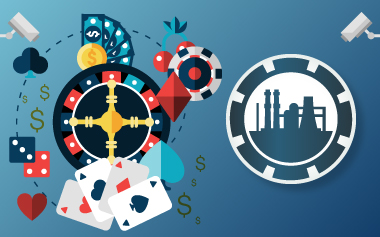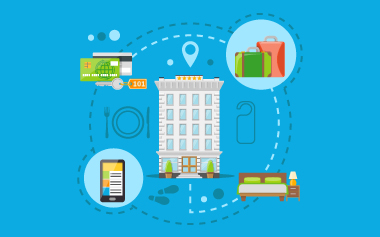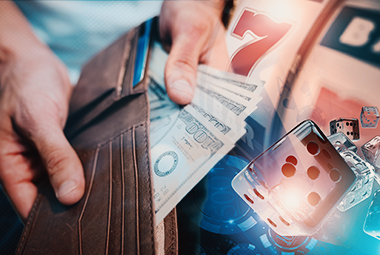Introduction
First of all, I would like to thank Gialmere for creating the following thread on our forums.
I would also like to credit his thread’s title for the title of this article.
In part, his opening post says:
It begins the moment you enter the building with hidden cameras using facial recognition technology to tag you. I assume, if you're a new customer, the computer assigns you a temporary ID number while returning guests would have their complete files accessed and attached to their facial images. The table games and checks/chips are all tagged with radio-frequency identification allowing your (real time) playing style to be sent to a centralized database where your risk profile is created and/or updated. Gamblers who keep playing when losing are singled out for immediate and future perks.

What games do you play? How much do you bet? How often do you win? Do you bet more when you lose? Do you enjoy high HE side bets? How often do you take a bathroom break or (in Macau) stop to use the smoking lounge. Do these breaks affect your play? Does alcohol affect it? Are you distracted by a pretty cocktail waitress?
In other words, the notion is that the casinos are creating detailed profiles of all of their players in an effort to identify the most profitable ones and cater to them more directly with comps, offers and other less tangible perks. (Like perhaps instructing cocktail waitresses to pay them special attention on their rounds.)
If the full extent of this technology becomes heavily used in the United States, as Gandler indicates further in the thread that it is, and that much of the information obtained is shared throughout the industry. That’s why things such as those mentioned by LoveComps who started this thread.
Can happen.
In that thread, Lovecomps indicates that he was contacted by a host at a casino at which he has no players card, though he does play at a nearby casino.
That can happen a variety of ways. For one thing, the two casinos may have an agreement with one another to share information on certain players. A host can switch casinos and then choose to market directly (or share information) on potentially profitable players, or you can have hosts who network with one another and share information on players.
What are the ethics of this information gathering and sharing? How does it compare to other industries?
Comparison to Other Industries
As everyone knows, the goal of a business is to make money by doing whatever it is the business does.
As many people will recall, Facebook was under some Congressional fire recently:
Related to the sharing and selling of user data, or using the data to target particular individuals with marketing efforts that see companies paying Facebook for ads. Obviously, the better the ads work, (the more money that is spent or more clicks to external sites) the more Facebook can charge for those ads as they are able to demonstrate that they market effectively and efficiently.
The fundamental problem is that the Facebook consumers (users) may not have realized the full extent of these efforts, may not have realized that their information was being shared and may not have realized to whom it was being shared.
Ultimately, the overall concept of what is going on in Macau is no different. The casino’s guests may not realize that their overall visit is being watched, tracked, judged and their habits stored in a database for marketing and other efforts, but that is what is happening.
The consumers may not like this, of course, but there are arguably some very real benefits to them. For one thing, a casino might understand that a guest prefers one type of restaurant over another, or consistently uses all restaurant offers (but not so much free play or match play offers), so the casino will focus its marketing to that player on dining and hotel deals. In this sense, the business is simply trying to give the customer what the customer values most.

Hotel Industry
When it comes to information sharing, the industry in which I have worked that might be most relevant is the hotel industry. In that industry, we obviously save all of a guest’s data and create a profile for that guest at the hotel level. We know whether they are going to, “Bite,” on an offer for a room upgrade that obviously costs them more than it costs the hotel. We know whether or not a guest is likely to complain about the room and get a partial refund. (If we’re probably going to sell out that night and the guest calls to book a room, I’d likely tell them that we are already sold out.)
We would also know the prices that a guest was willing to pay by keeping a record of prices that the guest declined. If our rack rate was more than the guest was willing to pay, it would give me the ability to decide whether or not I wanted to offer a guest a reduced rate for a given night, or whether I thought we could get more than that.
We would also network with other hotels, especially if a company had its employees staying at two different hotels, to determine how many rooms the company had at which hotels and at what cost. The goal, of course, was to be able to get the best (read: highest) rates out of that company that we could. In the event that a hotel would increase its rates to that company above the company’s liking, I would already know what the company had been paying at that hotel before, so I could call and offer them that rate or something slightly lower, if it was in the hotel’s interest to do so.
In fact, I wish there had been MORE information-sharing within the franchise network of hotels. Unfortunately for us, there was no centralized database of guests that would include all hotels in the network that we had access to at the individual hotel level. If there had been, then we would be able to know what rates, packages or deals that we could offer guests and be virtually assured that they would accept.
Even something as simple as guests complaining to the franchisor about their rooms would have been useful. I recall calling to dispute a guest’s complaint and to have the refund that the franchisor had already given to the guest credited back to us on the grounds that the complaint was invalid and also that neither the guest nor the franchisor afforded us the opportunity to settle it at the hotel level. (The guest had said she didn’t want to talk to us.)
Eventually, the representative looked at whatever it is he sees and noted that the guest had called in complaints about four other hotels in the network within the last six months. More than that, the guest had received a full or partial refund at every single property where the guest had stayed during that period.
Obviously, if I could have seen this information at the time the guest’s reservation had come in, (this guest had never stayed with us before, so I had no data on her) then I would have contacted the guest and informed her that we were cancelling her reservation at no charge on our end because we did not wish to have her stay at our property.
If that seems cold, remember that a business has the right to refuse service to whomever it wishes, provided that it’s not doing so to a protected class and for reasons having to do with that class. “Chronic complainer,” is not a protected class, so we would have opted to refuse service to this person.
Obviously, we would not refuse service to a guest who had stayed and complained once, especially if the guest had stayed with us before without complaint. When you have someone who complains about every single stay at every single property, then you have a person who is really just hunting for a lower rate by way of refund.

Grocery Store Cards
Some grocery stores have a shopper’s card, the concept of which is not all that different from a casino players club card, and there are stores where the card is mandatory if you want to get their sales prices.
As with the players club cards, all of an individual’s purchase data is tracked by computer and then coupons and other offers are sent out in a way that caters to the shopper. The grocery stores usually don’t sit and put together a coupon book for the customer by hand, so not every coupon in the book will reflect something the person actually buys, but there are different books that will go out to different people that are mostly in line with the stuff that they want.
Much like casinos have comps, so do grocery stores. Many of these coupon books will include completely free items for the shopper, and these free coupons are often consumer staples such as cheese, eggs or bread. The reason for that is that these items come to the store for a relatively low cost and are generally something that the shopper needs anyway. This page is a decent rundown for general purposes.
The goal is that the customer will use these free items to shop at the store more frequently, or will make a stop just to buy the free item and will also buy other items that were not originally intended. These staple items are usually located as far away as possible from the entrance for a reason, the customer has to walk by a bunch of other profit-items that they might decide to buy to get to them.
This can also result in increased shopping trips. Imagine a customer gets a call from a family member who says they are all out of milk: Instead of maybe stopping at the local convenience store to grab a gallon, the customer remembers they have a coupon for a free gallon of milk, so they go to the big store instead. While there the customers, more often than not, will decide to grab some other stuff. In some cases, this other stuff turns into a full shopping trip of its own.
The grocery store card data also tells the store about a whole lot more than that!
For one thing, total spend can be categorized by visit, weekly, monthly or annually. If a customer’s total spend drops by half from one month to another, that likely means that the customer is visiting a different store, (because the customer probably did not stop eating altogether) so it is time to hit the customer with some better offers. In many cases, these offers will include $XX.xx off of a minimum purchase of $XXX.xx. It can be $5 off of $50 or $10 off of $100, something like that. The goal is to take that customer’s money away from the new store and bring it back to your store, that’s why getting the value out of the coupon is tied to the total purchase amount.
Individual item purchases can also be tracked for other reasons. For example, if a customer is regularly spending x dollars on two units of diapers every month, and then suddenly stops, but the size of the diapers does not indicate that the baby has outgrown diapers; then they must be getting their diapers from somewhere else. Your grocery store wants that to stop, because if they are going to WalMart for diapers they’re probably getting other stuff there too, so now it’s time to send them a good coupon for their preferred brand of diapers.
Other Industries
This sort of tracking occurs in other industries as well. Most chain fast food restaurants, pizza places and other restaurants have some sort of app that gives a person deals and, “Makes ordering more convenient.” I don’t know if you’ve ever used one of these, but many of them absolutely do not make ordering more convenient. What’s convenient is calling a person on the phone and telling that person what I want, at least for me.
The goal is also not as simple as merely enticing a person into the store with the offers. The goal is getting the customer into the habit of visiting the restaurant, ordering online and generally spending as much money as possible. If the customer goes too long without using the app, or looks at the deals offered by the app but doesn’t use them, then the app will often send the customer an email or text message with a more personalized, and usually better, deal.
Ultimately, the goal is to determine how much the customer is willing to spend, and on what, and then to determine whether or not continuing to give that customer those offers is going to be profitable in the long-term. The app asks and answers a few different questions:
- Does this person only visit if they have an offer?
- Does this person have a preference for one particular type of offer while ignoring others?
- Does this person purchase anything that is not discounted, or only the items that are discounted by offers?
All of this information is being tracked, stored and the customer is given offers accordingly. Eventually a customer can be effectively backed-off (like how a casino might, “No Mail,” someone) and is free to visit the store but will not receive anymore decent offers by app, text or E-Mail.
It’s also for that reason that many of these apps award, “Points,” for making purchases and eventually the points can be used as restaurant credit or to unlock an offer. The restaurants are not doing this because it is not profitable for them. They are doing it for a few different reasons:
- It increases loyalty to the restaurant.
- It makes getting to a certain spend amount a, ‘Goal,’ so the customer can get the good offer.
- It makes it more likely that the customer will pay with the app, scan the phone or will order with the app. That seems unimportant, but what it means is that all of the purchases by that customer are being tracked, rather than having the customer come in and not use the app. (In the latter case, you would never know the customer visited, especially if paying cash.)
---In other words, these sorts of methods of customer tracking are happening across virtually all industries, and probably even some that we wouldn’t think of. Who knows what connections your credit cards, cell phone providers, internet service providers and other companies have to what other companies and how much/if they are paying for your information and data?
Why should casinos be any different?

The Concept of Spend
In the world of casinos, gamblers tend to think in terms of, ‘Winning,’ or, ‘Losing,’ when engaged in gambling activities. While this viewpoint is certainly valid, casinos (especially bigger ones) don’t look at it that way at all, they look at you in terms of your, “Spend.”
In other words, your gambling does not yield a win or a loss for the casino, other than advantage players, everybody is going to lose in the long run. Your gambling yields a theoretical, “Spend.” This spend is more commonly known as the, “Expected loss,” or simply, “Theoretical.”
However, money all spends the same. If you have a theoretical loss of $100 at the craps table for a session, or if you are going to spend $100 at a restaurant directly, it’s all the same to them ignoring the different costs required to provide the goods/services to garner that spend. The bigger chain casinos have learned to be as concerned overall with an individual’s total spend as they are with that individual’s gambling habits specifically, and it’s for that reason that an individual’s players card and spending will be tracked across all categories.
Casinos also want to know what your gambling habits are. If you hit a big win, are you likely to, “Give it all back and then some,” are you likely to take that money and spend it elsewhere on the property (still giving it back) or are you most likely to take your winnings and leave. An individual’s free play might be adjusted on these metrics. A casino might be more stingy with free play, or might even, “No Mail,” you if they determine that you are just going to take it and leave if you hit something good...or are going to take it and leave no matter what.
The casino will generally give a better overall package of future offers (including comps unrelated to free play) to winners and spenders. If getting you in the door and giving you some free stuff is going to be significantly outweighed by the amount of your own money you spend once you are there, then why wouldn’t they do it? That’s also a reason why room offers might be better for someone with a lower theoretical gambling loss than another person, it might simply be that the first person still spends more on direct.
Conclusion
It’s not really for me to say when player tracking goes too far in a casino, but rest assured that you are likely being tracked, by one means or another, anytime you are anywhere doing something that involves money. The goal of player tracking, as well as forms of spend tracking outside of the casino industry, is to extract as much money from the visitor as possible.
It always has been, is, and always will be. The only difference is that the means of doing it are becoming much more effective.
Comments
Grocery stores now measure your pace rate. Do you tarry in front of the yogurt display? Never forget Bluetooth can indeed bite. It can bite you in the wallet. If your phone gets a Starbucks coupon pushed to it as you are approaching a block that contains a Starbucks, that information may have been based on a variety of data inputs.
So yes, a casino looks at your strolling habits, your food consumption habits, everything that they can! Does it always work? No, but it sure works often enough or they wouldn't be doing it.
Fleastiff,
Pretty interesting, I've never even heard that term, but then I've not worked in a grocery store in well over a decade.
That's also an excellent point on the geo-tracking on the phone that I probably should have made in the article. Most apps at least give users the ability to opt out of location sharing, while some apps require a person to opt INTO location sharing. In any case, the apps know when you are close to the target destination, how often you pass it by, when you are likely to be around it in general...all kinds of stuff.
I think that the free casino game apps that are through the actual casino are analyzed for playing habits, as well, but I don't know how accurate that would be. I'd think the only reliable indicator (at all) would be whether or not a player is likely to drastically increase bets after a big win, but even that could be a false indicator, since it's not real money anyway.
For supermarkets, one good reason to track customer purchases is to contact them if there's a recall on an item. Years ago, something newsworthy happened with a grocery item (poison? contamination? I can't remember exactly), and the supermarket contacted all the purchasers who used their club card. That still happens, as in this case of listeria: https://www.timesunion.com/news/article/Price-Chopper-announces-Listeria-related-recall-13761103.php
But yeah, using the data for other purposes—usually to increase profits—is unseemly.
Smoothgrh,
That's also an excellent point, at least, for those chains that actually do that. I'm not sure that I am familiar with any who do, but perhaps it is some kind of opt-in program?
I don't know that I see it as unseemly, necessarily. For one thing, coupons are coupons, so the consumer is still saving money on that particular product(s) at the end of the day.
Personally, I would be happier with it if the entire thing was opt-in. By that I mean that people should not have to sign up for the card in order to get the sales prices, which they do at a few of the bigger supermarket chains. I could name multiple regional chains where this is not the case, they have to sign up in order to get fuel rewards and other niceties, but you get the sale prices whether or not you are using the card.
The Pace Rate tracking in grocery stores does not require geo-location to be turned on. The ultra short range receivers are scattered around the store and the data is sent to data-brokers automatically. If you linger near certain items, that information is sold even if they can't link it with your purchases.
That's pretty interesting. I actually don't think that's too bad if it's just measuring consumer habits (in general) in a way unlinked to an individual person's data.
As Joe-blow the nobody I don't really fear this tech. If, like me, you're part of the faceless masses, you'll probably only experience the benefits of it. What worries me (and I assume the privacy advocates) is how the data can be weaponized. Anyone who starts to rise above the level of the pack--via fame, fortune, and (especially) power--will become vulnerable.
It's bad enough already but imagine how it will be for the next generation. Every e-mail you ever sent, every post on social media, every tweet you liked or shared, every time you paused in front of the family planning section at a store, or placed a bet in a casino (hello IRS), or visited a strip club, all of it can and (if you're a somebody) probably will be used against you. Celebrities, corporate leaders, politicians etc. could be destroyed or blackmailed over some stupid, careless tweet they sent when they were 12. And who knows that which is acceptable now but will be intolerable in the future? The safest path will be to remain silent and avoid standing out: the safety of the herd. Then what happens to humanity?
It reminds of a story that's set in ancient China...
There was a time in China when all the provinces were in revolt, all of them that is except for one. Seeing this, the Emperor sent an envoy to the province to find out that Governor's secret to maintaining control. When he arrived at the provincial palace, the envoy asked the Governor how it was that all of China was in chaos and yet his area remained peaceful. In response the Governor led the envoy to the back of the palace and onto a veranda. A healthy field of wheat grew all the way up to the railings. Without saying a word, the Governor pick up a whip and began to casually flick off the top of any wheat stalk that grew more than an inch above the others.
I'll let you readers decide which province you'd like to live in.
Great comment, cool story!
Yeah, I think we already see that starting to become a problem for people with offhanded comments and images (and some things less or not provable) coming back to bite them. What can you do, though? Society loves that kind of stuff.



